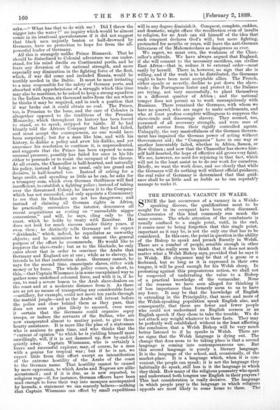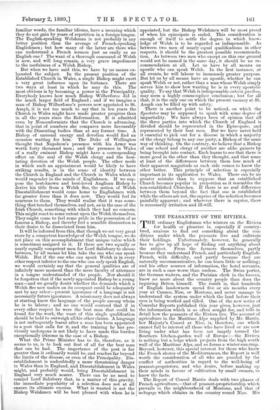THE EPISCOPAL VACANCY IN WALES.
SINCE the last occurrence of a vacancy in a Welsh- speaking diocese, the qualifications most to be sought for in its occupant have been often discussed. Controversies of this kind commonly run much the same course. The whole attention of the combatants is usually confined to a single point, until, in the end, it comes near to being forgotten that this single point, important as it may be, is not the only one that has to be considered. In this case, the point in question is the ability of the Bishop to speak and preach fluently in Welsh. There are a number of people, sensible enough in other matters, who really seem to think that it does not much matter what a Welsh Bishop says, provided that he says it in Welsh. His eloquence may be that of a goose or a firebrand, but so long as it is expressed in their own tongue, it will be good enough for his Welsh sheep. In protesting against this preposterous notion, we shall not be suspected of underrating the value to a Bishop of a practical knowledge of the vernacular. None of the reasons we have seen alleged for thinking it of less importance than formerly seem to us to have any force. It may be that the knowledge of English is extending in the Principality, that more and more of the Welsh-speaking population speak English also, and. consequently, that there are fewer and fewer people who could not understand an English sermon or an English speech if they chose to take the trouble. We do not attach any weight whatever to these facts. They may be perfectly well established without in the least affecting the conclusion that a Welsh Bishop will be very much better listened to if he speaks in Welsh. There are no signs that the Welsh language is dying out. The change that does seem to be taking place is that a second language is coming into contemporaneous use. But this second. language is purely a literary language. It is the language of the school, and, occasionally, of the market-place. It is a language which, when it is con- venient, the people can speak; it is not the language they habitually do speak, still less is it the language in which they think. How many of the religious peasantry who speak and understand both tongues use English in their prayers ? This last consideration is really decisive. The language in which people pray is the language in which religious appeals are most likely to come home to them. The familiar words, the familiar idioms, have a meaning which they do not gain by years of repetition in a foreign tongue. The English-speaking Welshman is not probably in any better position than the average of French-speaking Englishmen; but how many of the latter are there who can understand a French sermon just as easily as an English one ? The want of a thorough command of Welsh is now, and will long remain, a very grave impediment to the usefulness of a Welsh Bishop. But when we have said this, we have by no means ex- hausted the subject. In the present position of the Established Church in Wales, a single Bishop might exert a very great influence upon its fortunes. There are two ways at least in which he may do this. The most obvious is by becoming a power in the Principality. Everybody knows how much Bishop Wilberforce did in the much larger field of England ; and if we imagine a man of Bishop Wilberforce's powers now appointed to St. Asaph, it is not too much to say that in ten years the Church in Wales might have made greater progress than in all the years since the Reformation. It is admitted even by Nonconformists that the Church is advancing, that in point of numbers she compares more favourably with the Dissenting bodies than at any former time. A Bishop of unusual energy and devotion would find an occasion waiting for him. The Duke of Wellington thought that Napoleon's presence with his Army was worth forty thousand men; and the presence in Wales of a really eminent Bishop might have a corresponding effect on the zeal of the Welsh clergy and the hesi- tating devotion of the Welsh people. The other mode in which such an appointment would be likely to have striking results, is in the sense of identity between the Church in England and the Church in Wales which it would engender in the minds of Englishmen. If we sup- pose the best-known and best-loved Anglican Bishop to derive his title from a Welsh See, the notion of Welsh Disestablishment would come home to Englishmen with far greater force than it does now. They would feel its nearness to them. They would realise that it was some- thing that touched themselves, and not, as in the case of the Irish Church, something with which they had no concern. This might react to some extent upon the Welsh themselves. They might come to feel some pride in the possession of so famous a Bishop, and thereby feel a sensible diminution in their desire to be dissociated from him.
It will be inferred from this, that though we set very great store by a competent knowledge of the Welsh tongue, we do not place on this accomplishment that unique value which is sometimes assigned to it. If there are two equally or nearly equally competent men for Lord Salisbury to choose between, by all means let him take the one who can speak Welsh. But if the one who can speak Welsh is in every other respect inferior to the one who can only speak English, we would certainly say that the general qualities are of infinitely more moment than the mere faculty of utterance in a tongue understanded of the people. Nor should it be forgotten that if the newly appointed Bishop be a young man—and we greatly doubt whether the demands which a Welsh See now makes on its occupant could be adequately met by any other—present ignorance of a language is not necessarily future ignorance. A missionary does not always at starting know the language of the people among whom he is to labour; and no one would contend that if in every other respect he were the best man that could be found for the work, the want of this single qualification should be held to outweigh all his other claims. A language is not unfrequently learnt after a, man has been appointed to a post that calls for it, and the training he has pre- viously undergone is not likely to have made this burden exceptionally irksome in the case of a Bishop. What the Prime Minister has to do, therefore, as it seems to us, is to look out first of all for the best man that can be had. The importance of the post is far greater than it ordinarily would be, and reaches far beyond the limits of the diocese, or even of the Principality. Dis- establishment is undoubtedly a more threatening danger in Wales than in England, and Disestablishment in Wales might, and probably would, bring Disestablishment in England very much nearer. There can be no need to remind Lord Salisbury that, in a matter of this gravity, the immediate popularity of a selection does not at all ensure its ultimate success. What is wanted is not the Bishop Welshmen will be best pleased with when he is appointed, but the Bishop Welshmen will be most proud of when his episccipate is ended. This consideration is enough of itself to settle the degree in which know- ledge of Welsh is to be regarded as indispensable. As between two men of nearly equal qualifications in other respects, it should be the greatest possible recommenda- tion. As between two men who except on this one ground would not be named in the same day, it should be no re- commendation at all. Let us have by all means an apostle who can speak Welsh. In the first instance, at all events, he will labour to immensely greater purpose. But let us by all means have an apostle, whether he can speak Welsh or not, rather than a man whose Welsh simply serves him to show how wanting he is in every apostolic quality. To say that Welsh is indispensable czeterie pan bus, may seem a highly commonplace conclusion ; but for all that, it is the only one on which the present vacancy at St. Asaph can be filled up with safety.
There is another point to be noticed, on which the Spectator may be supposed to speak with some degree of impartiality. We have always been of opinion that all the three parties into which the Church of England is divided should be represented in the Episcopate, and represented by their best men. But we have never held it essential to pick out for a diocese in which a majority of the clergy belong to any one party, a Bishop of the same way of thinking. On the contrary, we believe that a Bishop of one school and clergy of another are alike gainers by being brought into contact. Each learns to see that there is more good in the other than they thought, and that some at least of the differences between them lose much of their apparent magnitude as each side comes to know the other better. This principle of selection is especially important in its application to Wales. There can be no greater mistake than to suppose that an established Church becomes popular in proportion as it resembles the non-established Churches. If there is no real difference between them beyond the fact that one is established while the others are not, the caprice of the selection becomes painfully apparent ; and wherever there is caprice, there is necessarily irritation and ill-will.



































 Previous page
Previous page